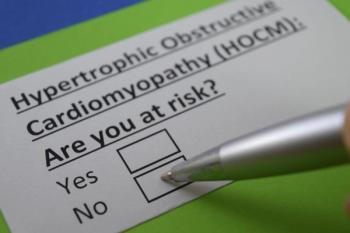
Study: Use of Azithromycin With QT Prolonging Drugs Linked to Cardiac Events
A study compared cardiac events associated with azithromycin versus amoxicillin.
Commonly used antibiotic azithromycin does not appear to increase the risk of cardiac events when compared with amoxicillin, except for when concurrently taken with QT-prolonging medications, according to new research published in JAMA Network Open.1
In 2012, the FDA issued a warning for azithromycin, stating that the drug had been linked to cardiac events. However, studies evaluating this association have produced mixed results.
The current study was a population-level analysis of nationally representative databases of prescriptions dispensed from outpatient pharmacies in the United States among patients with a mean age of 36 years old. Previous studies investigating azithromycin examined specific populations that tended to be older and have more health issues. Patients receiving either amoxicillin or azithromycin and enrolled in a health care plan 1 year before the dispensing date were included in the present study.
The primary outcome for the study consisted of cardiac events, including syncope, palpitations, ventricular arrhythmias, cardiac arrest, or death as a primary diagnosis for hospitalizations at 5, 10, and 30 days from the index date. The final cohort included approximately 2 million episodes of each index therapy. Within 5 days after therapy initiation, 1474 cardiac events occurred, with the most frequent being syncope and palpitations.
Overall, the results showed that, when compared with amoxicillin, azithromycin did not increase the risk of cardiac events. However, among patients taking any concurrent QT-prolonging drugs, the odds of cardiac events with azithromycin were 1.40 (95% CI, 1.04-1.87) greater compared with amoxicillin. No increased risk of cardiac events was observed with azithromycin in patients 65 years or older and those with a history of cardiovascular disease.
“Our findings should give researchers and clinicians looking at azithromycin as a potential treatment for COVID-19 a pause,” study investigator Haridarshan Patel, PharmD, PhD, a researcher in the department of pharmacy systems, outcomes and policy at the UIC College of Pharmacy, said in a statement.2 “We found that if taken together with drugs that affect the electrical impulses of the heart, the combination is linked with a 40% increase in cardiac events, including fainting, heart palpitations, and even cardiac arrest.”
The study investigators concluded that, although azithromycin is considered a safe therapy, clinicians should carefully consider its use in patients concurrently using other QT-prolonging drugs.
Results of a previous study reported that 1 in 5 individuals prescribed azithromycin also were taking a QT-prolonging drug.
“Because both QT-prolonging drugs and azithromycin are so commonly prescribed, the risk for cardiac events due to the combination, while still rare, is serious,” Patel said.2 “Studies looking at using azithromycin to treat COVID-19 or other diseases should very carefully consider its use among patients who are also taking QT-prolonging medications.”
References:
- Patel H, Calip GS, DiDomenico RJ, et al. Comparison of cardiac events associated with azithromycin vs amoxicillin. JAMA Network Open. 2020. doi: 10.1001/jamanetworkopen.2020.16864
- Potential COVID-19 drug azithromycin may increase risk for cardiac events. News release. University of Illinois Chicago; September 16, 2020. Accessed September 18, 2020. https://today.uic.edu/potential-covid-19-drug-azithromycin-may-increase-risk-for-cardiac-events.
Newsletter
Pharmacy practice is always changing. Stay ahead of the curve with the Drug Topics newsletter and get the latest drug information, industry trends, and patient care tips.























